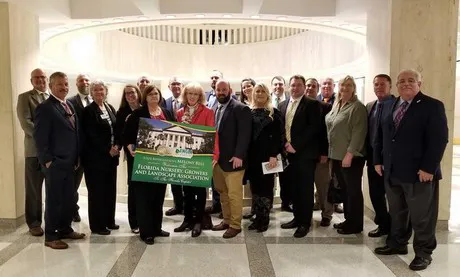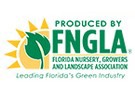FNGLA members understand each Spring represents new opportunities and new challenges - a chance to “grow” your business. Much the same as FNGLA members, newly elected officials arrive this Spring in Tallahassee for the 2019 Legislative Session.
by Jim Spratt, FNGLA's Government Affairs Consultant
There will be opportunities and challenges as FNGLA works to protect and promote Florida’s nursery and landscape industry. FNGLA will be focused and committed to supporting our nursery and greenhouse crop growers, landscape firms and retail businesses across our state. Here are a few ways FNGLA plans to keep agriculture and small business strong:
One of the benefits/impacts of term limits is they are not selectively applied. While the purpose of this article isn’t to debate term limits, their existence underscores one of the challenges FNGLA and other organizations, (especially agricultural groups) face in 2019.

For a moment, set aside your personal opinion of their politics. When it came to agriculture-friendly and pro-small business issues, the 2018 elections marked the exit for such staunch leaders as Florida Commissioner of Agriculture Adam Putnam; Senator Denise Grimsley; and, Representatives Halsey Beshears, Matt Caldwell and Rep. Jake Raburn. And, these were just a few of FNGLA’s strongest supporters!
While FNGLA has invested in relationships with many new members in the Florida Senate and House, there is no doubt we’re just in the beginning phase of developing new legislative champions.
Hurricane Michael relief and recovery
Hurricane Michael devastated communities in the Florida Panhandle and caused more than $1.5 billion in agricultural losses. While the storm’s narrow, yet potent, path impacted areas which are not heavy in nursery crop production, FNGLA members in the immediate areas were significantly impacted. FNGLA will be working with the Florida Farm Bureau and others to secure relief for growers, farmers and ranchers to recover. The agenda includes:
- Securing sales tax exemptions to rebuild damaged structures and fences;
- Providing less-than-perpetual conservation easements for timber and pasture lands;
- Securing debris removal, clean-up and reforestation funding; and,
- Increasing BMP cost-share funding to help replace damaged irrigation systems with more efficient units.
Water/Environmental Policy
Governor Ron DeSantis and the Florida Legislature have made it clear: water and environmental issues will be a major focus of this Legislative Session. So, FNGLA is mindful other stakeholder groups may seek to increase regulations on agricultural operations or even fundamentally change the Office of Agricultural Water Policy’s Best Management Practices (BMP) program.
FNGLA also expects Lake Okeechobee and the water quality impacts which plagued both coasts will take center-stage. FNGLA will continue to focus our efforts to ensure funding and policy changes are based on sound science with direct and positive impacts on water quality and quantity. Specifically, FNGLA supports implementation and funding of the following:
- Adequate funding for the FDACS Office of Agricultural Water Policy;
- Funding for the construction of emergency estuary protection wells within the Northern Everglades to help reduce discharges from Lake Okeechobee;
- Appropriate funding for storage and treatment of water on public lands north of Lake Okeechobee;
- Cost-share funding for septic-to-sewer conversion and/or the replacement of existing systems with advanced on-site technologies in strategic locations; and,
- Funding to expedite repairs to the Herbert Hoover Dike while encouraging the U.S. Army Corps of Engineers to increase water storage in Lake O.
Oppose mandatory E-Verify
For years now, immigration has been described as a “third-rail” political issue which legislators were leery of touching for fear of electrocuting their political careers. Today, though, one can argue immigration policy is in a class all unto itself. FNGLA opposes legislative measures mandating Florida businesses must use the voluntary federal E-Verify employment system.
FNGLA is working with a broad coalition (which includes business, hospitality, construction and other industries) to derail any state legislative measure seeking to impose E-Verify laws. FNGLA’s position remains unchanged: Immigration policy must be addressed at the federal level and it must include an economically and technically feasible guest-worker program to ensure our nursery and landscape businesses can get the labor needed to conduct business.
Constitutional amendment process
During 2018, FNGLA members and Floridians at-large were reminded of the perpetual flaws within Florida's constitutional amendment process. Most notably, the Constitution Revision Commission (CRC) meets every 20 years and has the power to send initiatives directly to the ballot for consideration.
Many can say the CRC became a political circus in the months leading up to the 2018 ballot. As a result, there is a growing statewide concern that Florida’s constitution is rapidly becoming the preferred way to escape the legislative, judicial and executive process. Several legislative measures seek to change the process by which Florida’s Constitution is amended and to simplify on what voters are actually voting. These include bills to:
- Raise the voting approval from its current 60 percent threshold up to 66 percent in order to pass an amendment to the state constitution;
- Eliminate the Constitution Revision Commission entirely; and,
- Limit each proposed amendment to a single-subject requirement.
University of Florida's Institute of Food and Agricultural Sciences
FNGLA’s relationship with the University of Florida/ IFAS is deep and strong. During the annual Legislative Session, FNGLA often gets the opportunity to assist UF/IFAS with its budget requests. Unfortunately, over the past two years, the UF/IFAS budget was cut in several key areas. This year, FNGLA is actively helping to support UF/IFAS budget requests, including its:
- Aquaculture, Geomatics and Horticulture Research and Education
Workload Funding; - STEM, Workforce and Student 4-H Programs; and, the
- Tropical Research and Education Center (TREC) in Homestead.
Florida Department of Agriculture and Consumer Services
FNGLA is excited about the relationship we’ve already built with Nikki Fried - the new Florida Commissioner of Agriculture and Consumer Services. FNGLA members understand the importance of having strong working relationships with FDACS given how frequently so many of the FDACS employees interact with you and your businesses.
FNGLA is already working to secure the necessary funding for programs essential to the success of Florida’s nursery and greenhouse crop operations and all of Florida agriculture such as the:
- Fresh From Florida marketing campaigns which include promoting Florida interior tropical foliage, outside landscape plants and certified landscape firms with certified professionals;
- Office of Agricultural Water Policy which works with nursery growers to implement and position Best Management Practices; and,
- Division of Plant Industry which inspects nurseries and issues the necessary certificates to ship plants.
For more information
FNGLA 
1533 Park Center Drive
Orlando, FL 32835-5705
Toll-Free: +1 (800) 375-3642
T: +1 (407) 295-7994
F: +1 (407) 295-1619
Email: info@fngla.org
www.fngla.org
